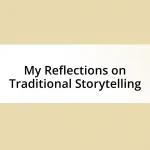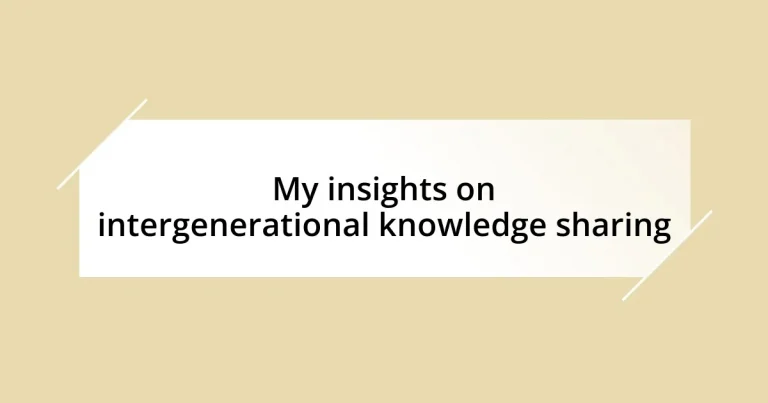Key takeaways:
- Intergenerational knowledge sharing enriches problem-solving and fosters emotional connections through storytelling.
- Challenges in knowledge transfer include communication styles, tech savviness, and time constraints between generations.
- Effective strategies for knowledge sharing involve mentorship programs, embracing technology, and encouraging storytelling.
- Real-life examples highlight successful intergenerational collaboration, demonstrating the value of diverse perspectives and mutual respect.
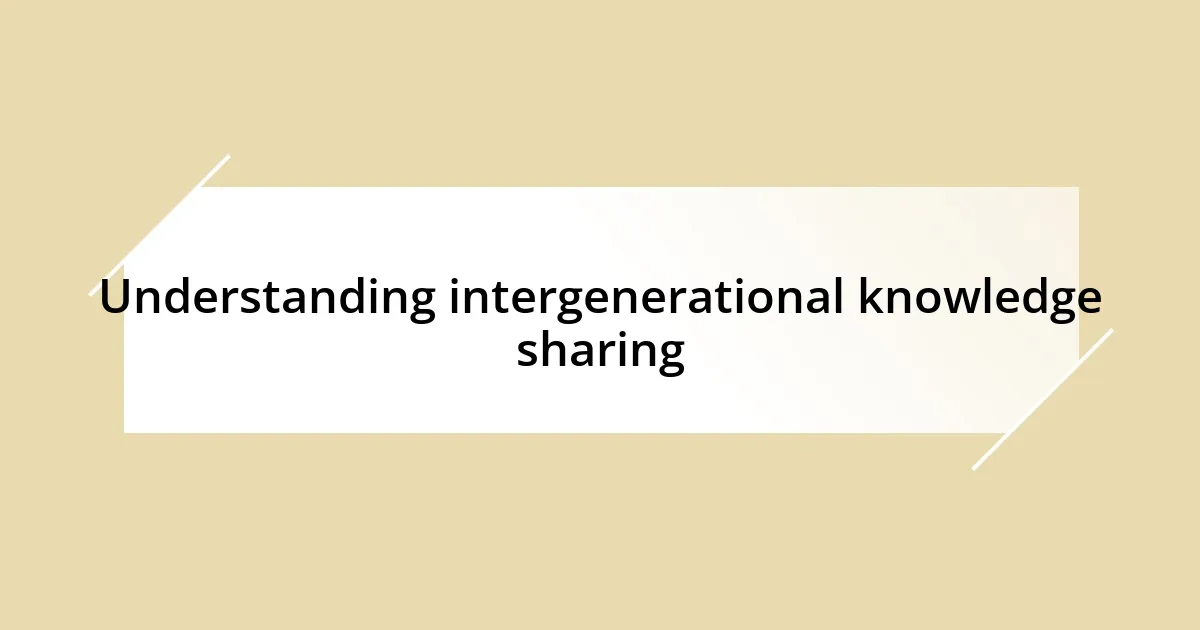
Understanding intergenerational knowledge sharing
Intergenerational knowledge sharing is so much more than just passing down facts; it’s about the emotional connections that form through stories and experiences. I remember sitting with my grandmother, listening to her recount stories of resilience during tough times. Those tales not only educated me but also forged a deeper bond, making me wonder: how can we create more spaces for these invaluable exchanges today?
There’s a certain beauty in the unique perspectives each generation brings to the table. Think about the innovations today—many stem from the wisdom of those who have lived through similar challenges before. It made me realize how critical it is for younger generations to ask questions and truly listen, not just to respond but to learn. Have you ever considered how much you might gain from simply reaching out and engaging in these conversations?
Moreover, sharing knowledge across generations builds empathy and understanding, bridging gaps that often seem insurmountable. I was once part of a community project where different age groups came together to share tech skills and life wisdom. Watching the younger participants light up as they learned from seasoned veterans was heartwarming. It prompted me to reflect: are we giving enough value to these interactions in our hectic lives?
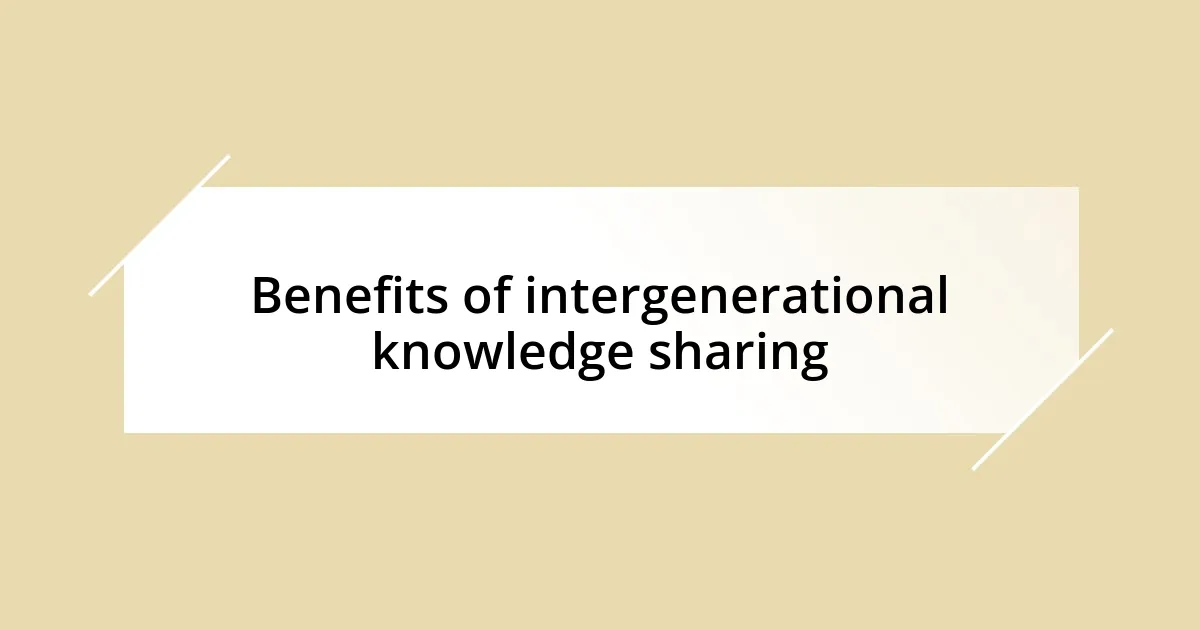
Benefits of intergenerational knowledge sharing
One major benefit of intergenerational knowledge sharing is the enrichment of problem-solving skills. I recall a time when my younger colleague faced a significant challenge in her project. I suggested she talk to a retired engineer with decades of experience in that area. Their conversation opened her eyes to creative solutions she hadn’t considered before. When generations share their unique experiences, they can collectively tackle problems more effectively.
Additionally, knowledge sharing fosters a sense of community. Think about a family gathering where grandparents share stories from their lives. I cherish those moments because it reminds us all of our shared history and strengthens our bonds. In a workplace, when older and younger employees collaborate, it creates a more inclusive environment, boosting morale and teamwork. It feels good to know that everyone’s voice is valued.
Finally, the emotional connections formed through these exchanges are invaluable. A few years back, I volunteered at a local senior center, where I facilitated workshops between young volunteers and older participants. The joy in their eyes as they exchanged life lessons was profound. These interactions not only impart knowledge but also foster respect across generations. Whenever I see the smiles and laughter, I’m reminded that we all have something to learn from each other.
| Benefit | Description |
|---|---|
| Enhanced Problem-Solving | Collaborative perspectives lead to innovative solutions. |
| Community Building | Strengthens bonds and creates a sense of belonging. |
| Emotional Connections | Fosters respect and mutual understanding across ages. |
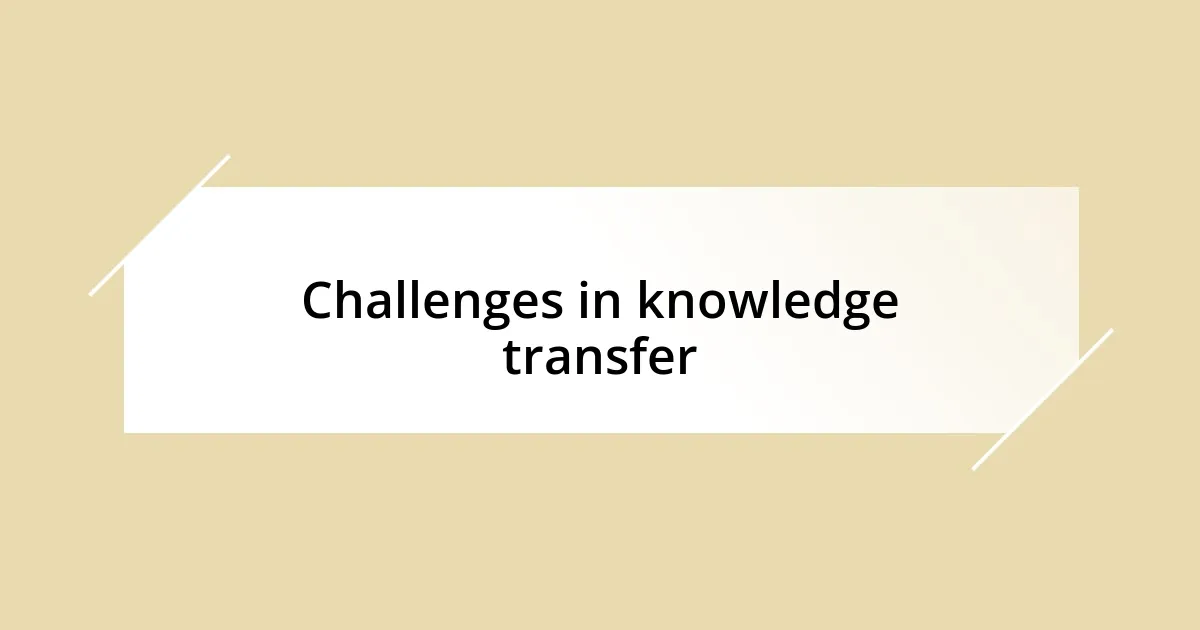
Challenges in knowledge transfer
Many challenges arise in the process of knowledge transfer between generations. From my experience, one significant barrier is simply the different ways people communicate. For instance, I found that while older generations often prefer face-to-face discussions filled with storytelling, younger individuals may lean towards quick texts or emails. This mismatch can lead to misunderstandings and disengagement.
Here are some specific challenges I’ve observed:
- Tech Savviness: Younger generations are generally more comfortable with digital tools. Older generations might struggle with these platforms, making it hard to share knowledge.
- Perception Gaps: There can be preconceived notions about each generation’s competence. I remember feeling like my younger colleagues sometimes undervalued the insights of my seasoned peers, resulting in lost chances for collaboration.
- Time Constraints: Many of us lead fast-paced lives. I often see younger individuals rushing through interactions, missing the opportunity to truly listen and absorb what older generations have to offer.
- Emotional Disconnect: Emotional barriers can hinder sharing. I once witnessed a seasoned professional hesitate to share personal anecdotes due to fear of judgment from younger counterparts, which was disheartening.
Understanding these challenges is essential as we strive to foster more effective intergenerational knowledge sharing.
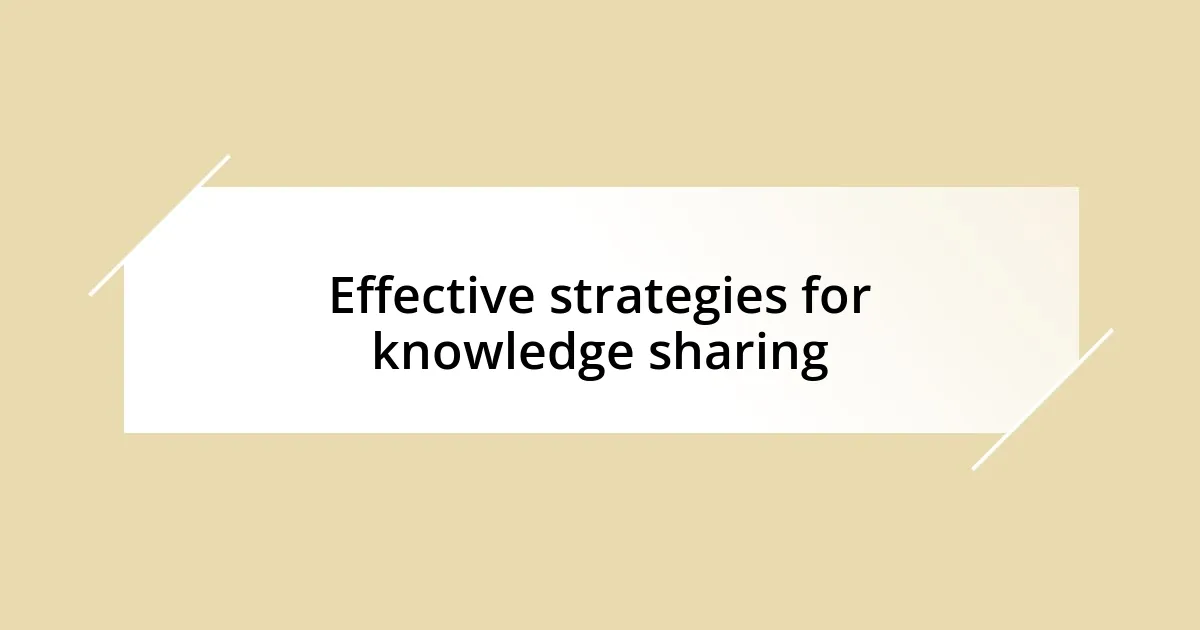
Effective strategies for knowledge sharing
One effective strategy for knowledge sharing is creating mentorship programs that pair younger individuals with seasoned professionals. I remember when I participated in a mentorship initiative; it was eye-opening to see how a structured relationship, with regular check-ins and shared goals, facilitated open communication. This approach not only helps bridge the experience gap but also builds trust, allowing mentees to feel comfortable asking questions and sharing thoughts.
In my opinion, leveraging technology plays a vital role too. Virtual platforms like video calls and shared workspaces can enhance interactions. For instance, I once set up a collaborative online project where team members from different generations contributed their expertise. The result was a dynamic exchange that felt engaging and ensured everyone felt included, regardless of their preferred communication style. Isn’t it fascinating how a simple tool can transform the way we connect?
Lastly, encouraging storytelling as a means of knowledge transfer can be incredibly powerful. I clearly recall a workshop where I invited team members to share personal experiences related to project challenges. The atmosphere changed dramatically; participants no longer felt like employees, but rather a community sharing valuable lessons. Why is storytelling so compelling? It taps into our emotions, making the information memorable and relatable. I believe incorporating storytelling into interactions nurtures deeper connections and enhances the learning experience for all involved.
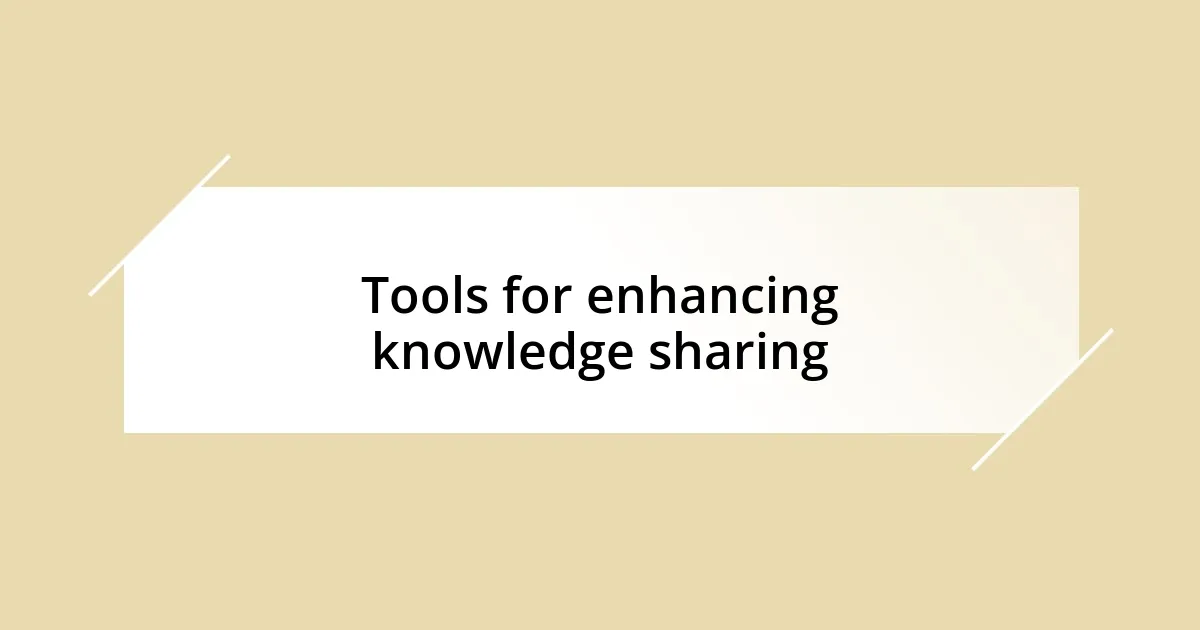
Tools for enhancing knowledge sharing
One tool that I’ve found particularly effective in enhancing knowledge sharing is the use of collaborative platforms. A few years ago, I participated in a project where we utilized a digital whiteboard. It was eye-opening to see how a simple tool could encourage real-time brainstorming among different generations. Everyone could contribute their thoughts simultaneously, breaking down the barriers of traditional hierarchies. Have you ever experienced the magic of collective idea generation? It can really spark creativity and foster a sense of belonging.
Another vital tool is the integration of workshops and interactive sessions dedicated to sharing expertise. I vividly recall attending a company-led workshop where seasoned professionals dived deep into their past projects. It was more than just a presentation; it turned into a lively discussion where younger team members posed questions and shared their insights too. This two-way dialogue not only enriched our understanding but also built a genuine connection between the generations. Don’t you think that an atmosphere encouraging dialogue elevates the entire learning experience?
Incorporating feedback loops can also be transformative. In my experience, after completing a knowledge-sharing session, we always made it a point to hold brief discussions on what participants enjoyed or found challenging. One time, we learned that integrating more visual content significantly improved engagement for both young and older attendees. Reflecting on these insights allowed us to adjust our future sessions effectively. Isn’t that incredible? Feedback not only helps polish the process but also sends a clear message that every voice matters.
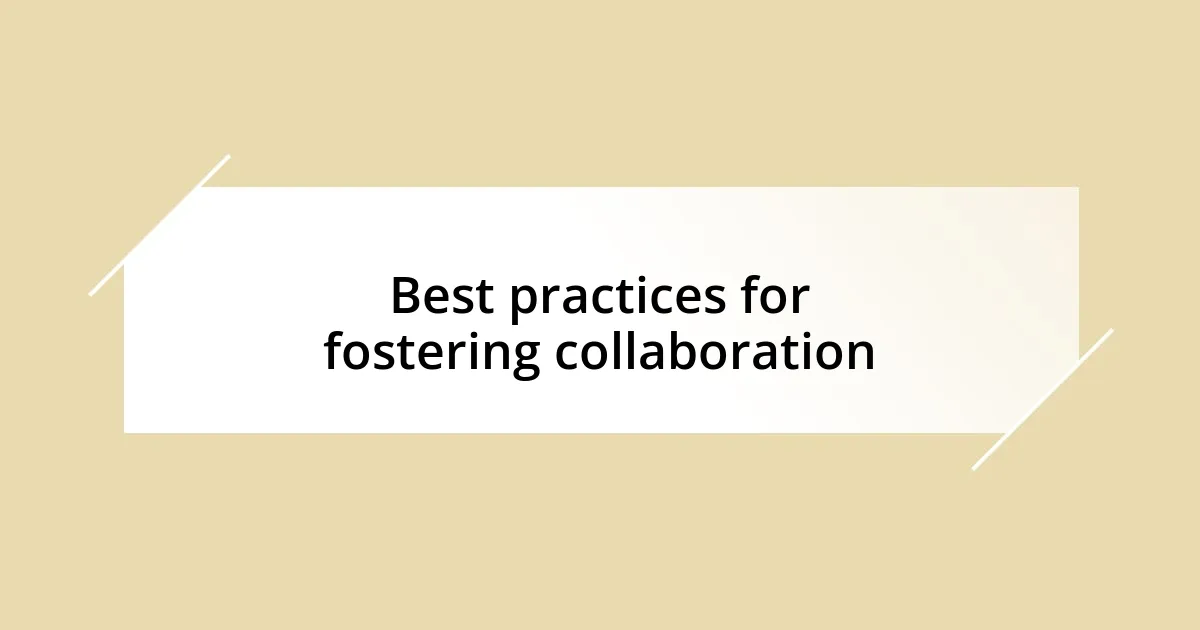
Best practices for fostering collaboration
When fostering collaboration, I find that creating a safe space for diverse opinions really makes a difference. I recall a team brainstorming session where we intentionally encouraged every voice to be heard. It was remarkable to see how individuals, initially hesitant, began sharing unique perspectives once they sensed their contributions mattered. Have you ever noticed how just a little encouragement can unlock creativity?
Another best practice I swear by is regular team-building activities designed to strengthen relationships. In my experience, a simple lunch or casual outing can dissolve formal barriers, allowing team members to connect on a personal level. I participated in a team retreat where we tackled challenges through fun games, and it paved the way for more open conversations back in the office. Isn’t it interesting how a little fun can lead to more robust collaboration?
Additionally, setting clear expectations for collaboration is crucial. I vividly remember a project launch where we established not only goals but also norms for communication and feedback. This clarity helped everyone align and stay accountable. Why do you think having structured guidelines makes such a difference? From my viewpoint, it empowers individuals to contribute fully, leading to a sense of ownership that enhances collective outcomes.
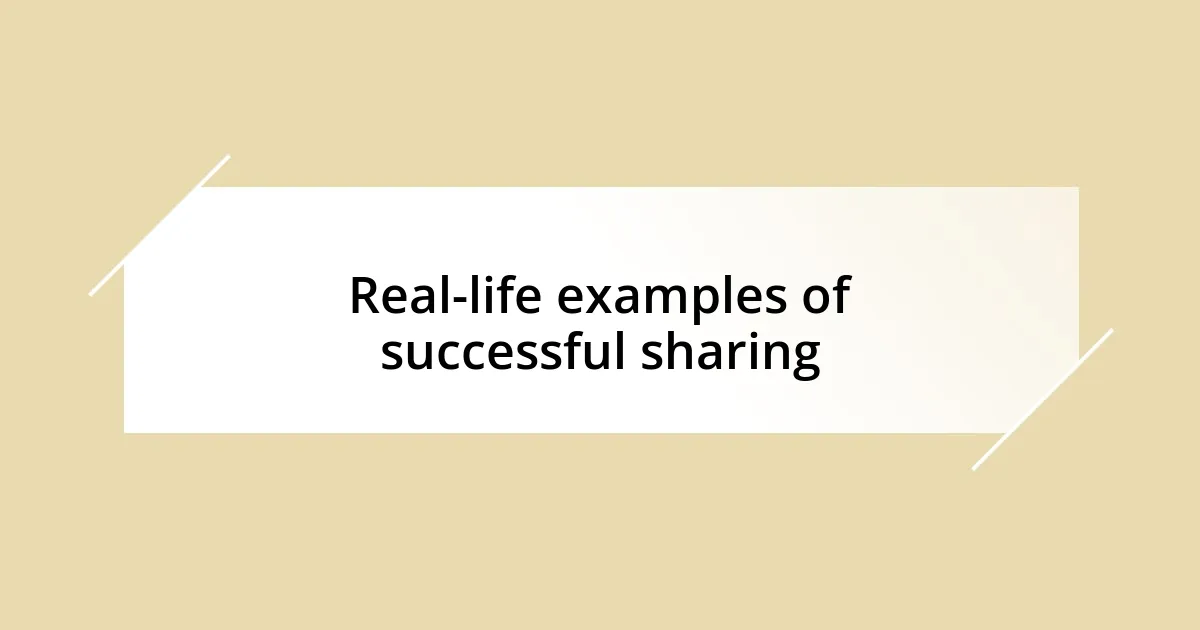
Real-life examples of successful sharing
I remember a community project that brought together retired educators and young students, and it was a fantastic example of successful knowledge sharing. The elderly volunteers shared their teaching experiences and stories, while the students contributed fresh ideas on modern technology and learning methods. Seeing those connections spark enthusiasm and mutual respect was incredibly rewarding. Have you ever witnessed the power of storytelling to bridge gaps across generations?
In another instance, I was part of a mentoring program where senior employees paired with interns to work on a tangible project. The mentors provided invaluable insights from their careers, and in return, the interns introduced innovative approaches they learned at school. The result was not just a successful project, but a blossoming of relationships that have lasted beyond the program. Isn’t it fascinating how knowledge sharing can inspire ongoing collaboration and friendship?
Lastly, I once attended a roundtable event that exemplified intergenerational knowledge sharing beautifully. Younger professionals were invited to present their ideas, while seasoned experts provided constructive feedback and shared their experiences related to those ideas. This open dialogue created a vibrant atmosphere, encouraging everyone to think critically and creatively. It reminded me of the importance of inviting participation from all ages—what better way to foster innovation than by combining diverse perspectives?










